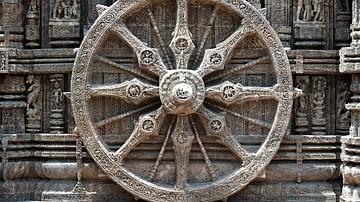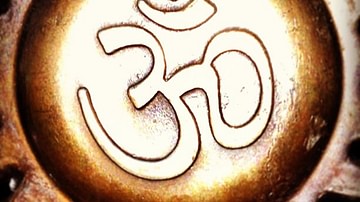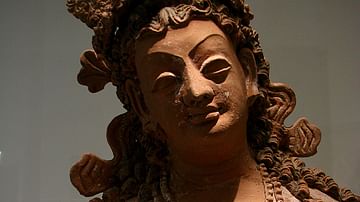Search
Summary 
Loading AI-generated summary based on World History Encyclopedia articles ...
Search Results

Definition
Hinduism
Hinduism is the oldest religion in the world, originating in Central Asia and the Indus Valley, still practiced in the present day. The term Hinduism is what is known as an exonym (a name given by others to a people, place, or concept) and...

Definition
Bhagavad Gita
The Bhagavad Gita (“Song of God” or “Song of the Lord”) is among the most important religious texts of Hinduism and easily the best known. It has been quoted by writers, poets, scientists, theologians, and philosophers – among others – for...

Image
Dharma Wheel
The Dharmachakra (Skt: wheel of the law with eight spokes) represents the Eightfold Path (Right View, Right Resolve, Right Speech, Right Actions, Right Occupation, Right Effort, Right Mindfulness, and Right Concentration). Konark Sun temple...

Definition
Upanishads
The Upanishads are the philosophical-religious texts of Hinduism (also known as Sanatan Dharma meaning “Eternal Order” or “Eternal Path”) which develop and explain the fundamental tenets of the religion. The name is translated as to “sit...

Image
Japanese Dharma Wheel
A gilt bronze dharma wheel used in Buddhist rituals. 13th century CE. (Tokyo National Museum)

Definition
Brahmanism
Brahmanism (also known as Vedic Religion) is the belief system that developed from the Vedas during the Late Vedic Period (c. 1100-500 BCE) originating in the Indus Valley Civilization after the Indo-Aryan Migration c. 2000-1500 BCE. It claims...

Definition
Buddhism
Buddhism is a non-theistic religion (no belief in a creator god), also considered a philosophy and a moral discipline, originating in the region of modern-day India in the 6th and 5th centuries BCE. It was founded by the sage Siddhartha Gautama...

Definition
Pandavas
Pandavas were the five powerful and skilled sons of Pandu, the King of Hastinapur and his two wives Kunti and Madri. Hastinapur is equated with the current modern Indian state of Haryana, south of New Delhi. The Pandavas – Yudhistira, Bhima...

Definition
Mahasanghika
Mahasanghika (“Great Congregation”, also given as Mahasamghika) was an early Buddhist school of thought which is thought to have been formed after the Second Buddhist Council of 383 BCE when it separated itself from another school, the Sthaviravada...

Definition
Ancient India
India is a country in South Asia whose name comes from the Indus River. The name 'Bharata' is used as a designation for the country in their constitution referencing the ancient mythological emperor, Bharata, whose story is told, in part...